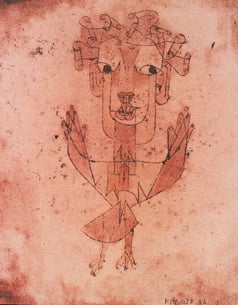 |
| Paul Klee's Angelus Novus (1920) |
By eviscerating public services and reducing them to a network of farmed-out private providers, we have begun to dismantle the fabric of the state. As for the dust and powder of individuality: it resembles nothing so much as Hobbes's war of all against all, in which life for many people has once again become solitary, poor and more than a little nasty.But then Giroux shifts to a discussion of the German Jewish philosopher Walter Benjamin who wrote a "now famous" book, Thesis on the Philosophy of History. Are you wondering when I'm going to get to the angel? Here it comes.
In Benjamin's ninth thesis he comments Klee's angel. Thus:
"Angelus Novus" shows an angel looking as though he is about to move away from something he is fixedly contemplating. His eyes are staring, his mouth is open, his wings are spread. This is how one pictures the angel of history. His face is turned toward the past. Where we perceive a chain of events, he sees one single catastrophe which keeps piling wreckage upon wreckage and hurls it in front of his feet. The Angel would like to stay, awaken the dead and make whole what has been smashed. But a storm is blowing from Paradise; it has got caught in his wings with such violence that the angel can no longer close them. The storm irresistibly propels into the future to which his back is turned, while the pile of debris before him grows skyward. This storm is what we call progress.I thought this was a really fascinating interpretation of this work. And that's why I'm sharing it with you. By the way, I went looking on the Net for additional interpretations, and after about five tries I gave it up. Everybody cites Benjamin.
2 comments:
Great post on the "helplessness" of supernatural beings.
Benjamin is rather good, but I have only studied his Arcades Project, and I continue to do so. I suppose it gives me a one-sided view.
Not one-sided if you agree with the guy. :-)
Post a Comment